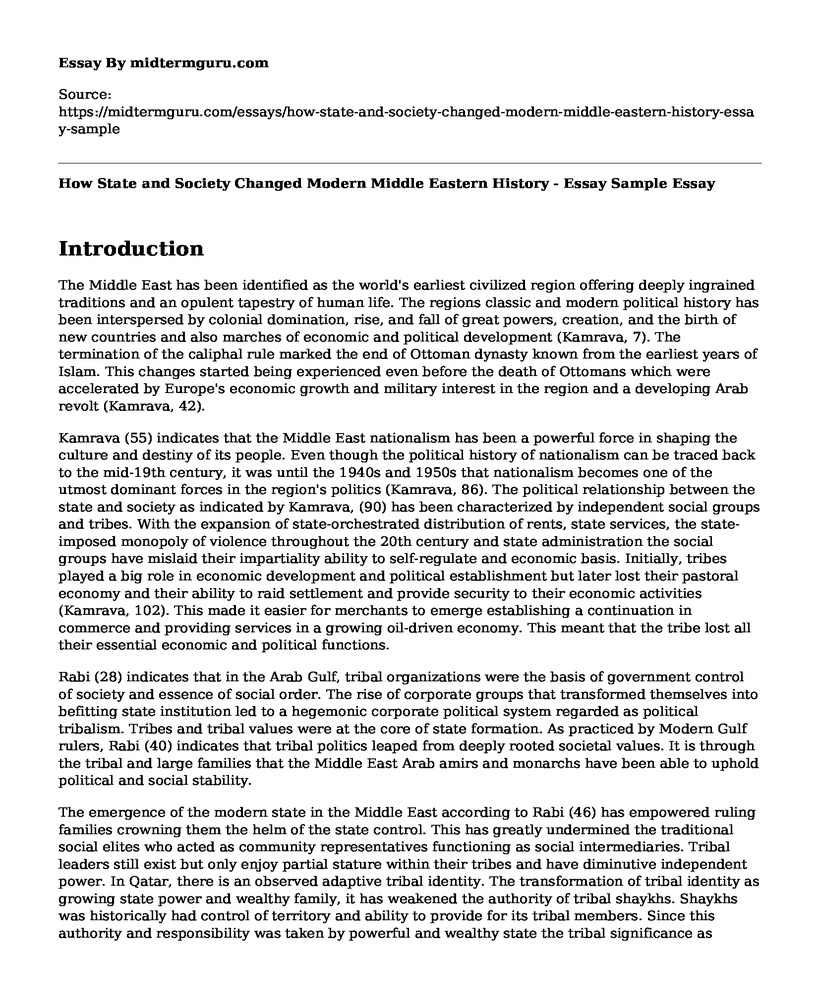Introduction
The Middle East has been identified as the world's earliest civilized region offering deeply ingrained traditions and an opulent tapestry of human life. The regions classic and modern political history has been interspersed by colonial domination, rise, and fall of great powers, creation, and the birth of new countries and also marches of economic and political development (Kamrava, 7). The termination of the caliphal rule marked the end of Ottoman dynasty known from the earliest years of Islam. This changes started being experienced even before the death of Ottomans which were accelerated by Europe's economic growth and military interest in the region and a developing Arab revolt (Kamrava, 42).
Kamrava (55) indicates that the Middle East nationalism has been a powerful force in shaping the culture and destiny of its people. Even though the political history of nationalism can be traced back to the mid-19th century, it was until the 1940s and 1950s that nationalism becomes one of the utmost dominant forces in the region's politics (Kamrava, 86). The political relationship between the state and society as indicated by Kamrava, (90) has been characterized by independent social groups and tribes. With the expansion of state-orchestrated distribution of rents, state services, the state-imposed monopoly of violence throughout the 20th century and state administration the social groups have mislaid their impartiality ability to self-regulate and economic basis. Initially, tribes played a big role in economic development and political establishment but later lost their pastoral economy and their ability to raid settlement and provide security to their economic activities (Kamrava, 102). This made it easier for merchants to emerge establishing a continuation in commerce and providing services in a growing oil-driven economy. This meant that the tribe lost all their essential economic and political functions.
Rabi (28) indicates that in the Arab Gulf, tribal organizations were the basis of government control of society and essence of social order. The rise of corporate groups that transformed themselves into befitting state institution led to a hegemonic corporate political system regarded as political tribalism. Tribes and tribal values were at the core of state formation. As practiced by Modern Gulf rulers, Rabi (40) indicates that tribal politics leaped from deeply rooted societal values. It is through the tribal and large families that the Middle East Arab amirs and monarchs have been able to uphold political and social stability.
The emergence of the modern state in the Middle East according to Rabi (46) has empowered ruling families crowning them the helm of the state control. This has greatly undermined the traditional social elites who acted as community representatives functioning as social intermediaries. Tribal leaders still exist but only enjoy partial stature within their tribes and have diminutive independent power. In Qatar, there is an observed adaptive tribal identity. The transformation of tribal identity as growing state power and wealthy family, it has weakened the authority of tribal shaykhs. Shaykhs was historically had control of territory and ability to provide for its tribal members. Since this authority and responsibility was taken by powerful and wealthy state the tribal significance as weakened (Rabi 145). The growing expatriate population formed a growing, defensive modernization of indigenous identity that was both national and tribal. This transformation in Qatar has been adopted to the neighbor states in relation to the political evolution of tribal identity. This has had an endurance and occasional political implication over the cross-border linkages.
Work Cited
Kamrava, Mehran. The Modern Middle East: A Political History Since the First World War., 2015. Print.
Rabi, Uzi. Tribes and States in a Changing Middle East. New York: Oxford University Press, 2016. Print.
Cite this page
How State and Society Changed Modern Middle Eastern History - Essay Sample. (2022, Sep 28). Retrieved from https://midtermguru.com/essays/how-state-and-society-changed-modern-middle-eastern-history-essay-sample
If you are the original author of this essay and no longer wish to have it published on the midtermguru.com website, please click below to request its removal:
- Barriers to Communications in Research Work - Paper Sample
- Essay on 21st Century Family
- Paper Example on Gender and Gender Roles
- The Course of The World War 1 - Research Paper
- Does Family Only Encompass Blood Relations? - Essay Sample
- America Reconstruction: 1865-1877: The Struggle for Meaningful Liberty - Essay Sample
- Research Paper on Social Change: A Collaborative Effort Through Action Research







